
Albert of Brandenburg was a German cardinal, elector, Archbishop of Mainz from 1514 to 1545, and Archbishop of Magdeburg from 1513 to 1545.
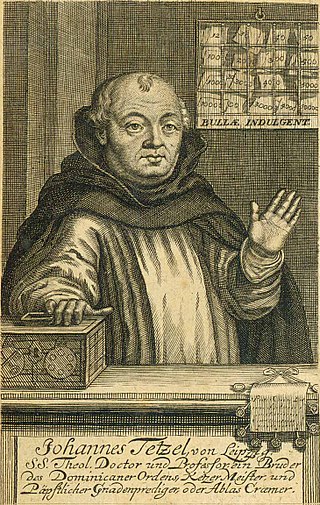
Johann Tetzel was a German Dominican friar and preacher. He was appointed Inquisitor for Poland and Saxony, later becoming the Grand Commissioner for indulgences in Germany. Tetzel was known for granting indulgences on behalf of the Catholic Church in exchange for money. Indulgences grant a remission of temporal punishment due to sin, the guilt of which has been forgiven. This largely contributed to Martin Luther writing his Ninety-five Theses. The main usage of the indulgences sold by Tetzel was to help fund and build the new St. Peter's Basilica in Rome.
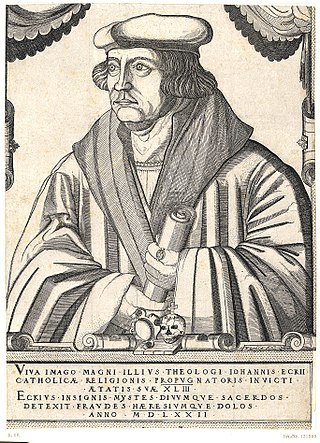
Johann Maier von Eck, often anglicized as John Eck, was a German Catholic theologian, scholastic, prelate, and a pioneer of the counter-reformation who was among Martin Luther's most important interlocutors and theological opponents.

The Ninety-five Theses or Disputation on the Power and Efficacy of Indulgences is a list of propositions for an academic disputation written in 1517 by Martin Luther, then a professor of moral theology at the University of Wittenberg, Germany. The Theses is retrospectively considered to have launched the Protestant Reformation and the birth of Protestantism, despite various proto-Protestant groups having existed previously. It detailed Luther's opposition to what he saw as the Roman Catholic Church's abuse and corruption by Catholic clergy, who were selling plenary indulgences, which were certificates supposed to reduce the temporal punishment in purgatory for sins committed by the purchasers or their loved ones.

Frederick III, also known as Frederick the Wise, was Elector of Saxony from 1486 to 1525, who is mostly remembered for the worldly protection of his subject Martin Luther.

John Frederick I, called the Magnanimous, was the Elector of Saxony (1532–1547) and head of the Schmalkaldic League.

Torgau is a town on the banks of the Elbe in northwestern Saxony, Germany. It is the capital of the district Nordsachsen.

Andreas Rudolph Bodenstein von Karlstadt, better known as Andreas Karlstadt, Andreas Carlstadt or Karolostadt, in Latin, Carolstadius, or simply as Andreas Bodenstein, was a German Protestant theologian, University of Wittenberg chancellor, a contemporary of Martin Luther and a reformer of the early Reformation.

Thomas Cajetan, OP, also known as Gaetanus, commonly Tommaso de Vio or Thomas de Vio, was an Italian philosopher, theologian, the Master of the Order of Preachers 1508 to 1518, andcardinal from 1517 until his death. He was a leading theologian of his day who is now best known as the spokesman for Catholic opposition to the teachings of Martin Luther and the Protestant Reformation while he was the Pope's legate in Augsburg, and among Catholics for his extensive commentary on the Summa Theologica of Thomas Aquinas.

Georg(e) Spalatin was the pseudonym taken by Georg Burkhardt, a German humanist, theologian, reformer, secretary of the Saxon Elector Frederick the Wise, as well as an important figure in the history of the Reformation.
Karl von Miltitz was a papal nuncio and a Mainz Cathedral canon.
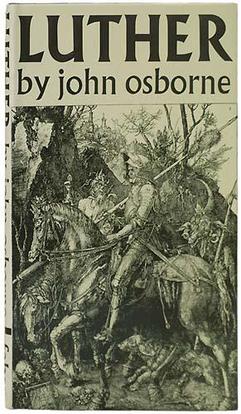
Luther is a 1961 play by John Osborne depicting the life of Martin Luther, one of the foremost instigators of the Protestant Reformation. Albert Finney created the role of Luther, which he performed with the English Stage Company at the Theatre Royal, Nottingham, the Théâtre Sarah Bernhardt, Paris, the Holland Festival, the Royal Court Theatre, London, the Phoenix Theatre, London, and the St. James Theatre, New York.
Lutheranism as a religious movement originated in the early 16th century Holy Roman Empire as an attempt to reform the Roman Catholic Church. The movement originated with the call for a public debate regarding several issues within the Catholic Church by Martin Luther, then a professor of Bible at the young University of Wittenberg. Lutheranism soon became a wider religious and political movement within the Holy Roman Empire owing to support from key electors and the widespread adoption of the printing press. This movement soon spread throughout northern Europe and became the driving force behind the wider Protestant Reformation. Today, Lutheranism has spread from Europe to all six populated continents.
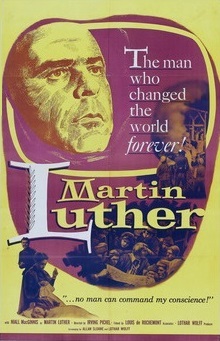
Martin Luther is a 1953 American–West German film biography of Martin Luther. It was directed by Irving Pichel,, and stars Niall MacGinnis as Luther. It was produced by Louis de Rochemont and RD-DR Corporation in collaboration with Lutheran Church Productions and Luther-Film-G.M.B.H.
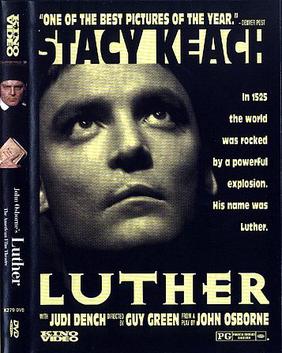
Luther is the 1974 American biographical drama film of John Osborne's biographical play, presenting the life of Martin Luther. It was one of eight in the first season of the American Film Theatre's series of plays made into films. It was produced by Ely Landau, directed by British director Guy Green, and filmed at Shepperton Studios, England. The film presents Martin Luther and his legacy for the world to evaluate. The young knight narrator is an "everyman" character who confronts Luther for advocating the suppression of the Peasants' Revolt of 1524–1526.
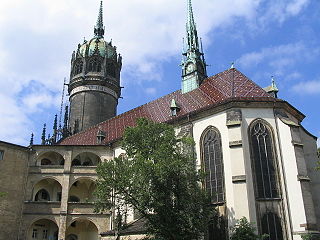
All Saints' Church, commonly referred to as Schlosskirche to distinguish it from the Stadtkirche of St. Mary's, sometimes known as the Reformation Memorial Church, is a Lutheran church in Wittenberg, Saxony-Anhalt, Germany. It is the site where, according to Philip Melanchthon, the Ninety-five Theses were posted by Martin Luther in 1517, launching the beginning of the Protestant Reformation.
Kaspar Glatz was a minor figure in reformation-era Lutheranism. Trained in the early days of the reformation by Martin Luther at Wittenberg, he served as a pastor in the new movement for more than 20 years. The most comprehensive biographical sketch is contained in the late nineteenth-century Allgemeine Deutsche Biographie.
Martin Luther, Heretic is a 1983 film made to commemorate the 500th anniversary of the birth of Martin Luther. It was released on 8 November 1983 in the United Kingdom, two days before the 500th jubilee on 10 November. It starred Jonathan Pryce as Martin Luther. Maurice Denham reprised his role of Johann von Staupitz that he played in the 1973 American Film Theater film Luther. The time frame of the film is 1506-1522: the beginning of Luther's monastic vocation to his return from exile at the Wartburg in 1522. A medieval dramatic troupe's performances of mystery plays provide the unifying motif for a parallel telling of the story of the film. When Luther's carriage en route from the Wartburg to Wittenberg it is shown passing an actor wearing a devil's mask. When this scene is revisited at the end of the film, the actor slips this mask off his face.
An imperial election was held in Regensburg on 28 November 1562 to select the emperor of the Holy Roman Empire.
The imperial election of 1653 was an imperial election held to select the emperor of the Holy Roman Empire. It took place in Augsburg on May 31.














